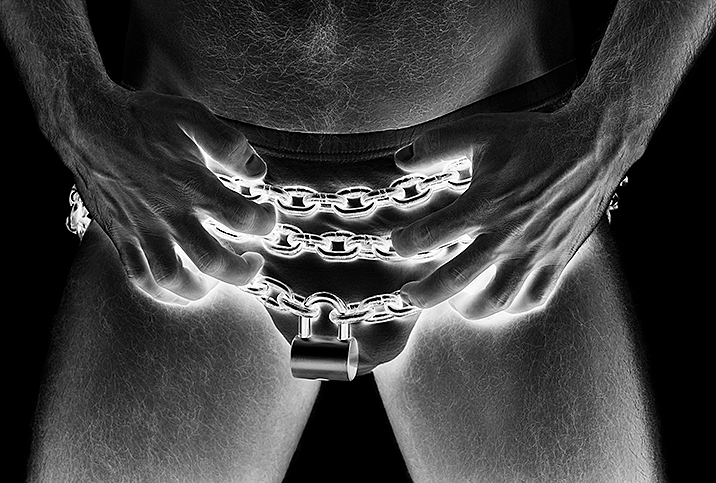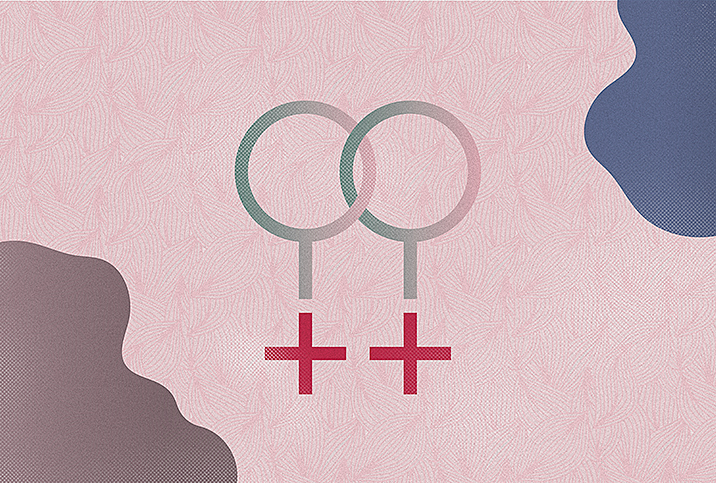Yes, Queer People Choose Celibacy, Too

In 2019, Amanda, a 23-year-old lesbian, tested positive for HIV. She'd contacted the virus from her first queer hookup, a woman who helped her explore her sexuality. "She hadn't told me she had the virus, and then we had unprotected sex," Amanda said. "Getting HIV was one of my biggest fears, and I felt I would die."
After dealing with her depression and suicidal ideation with the help of a therapist and her family, Amanda decided to embark on a period of celibacy. She saw this as a way to regenerate and "regain [her] true self," and hoped it would help "erase the insecurities that festered" within her.
In the wake of a homophobic attack in Lagos, Nigeria, Patrick, a 32-year-old banker, also decided to try a year without sex to give himself time to heal from the trauma and treat his mental health problems. He said this decision has been a great idea, and that he's "getting better now."
Queer people like Amanda and Patrick aren't usually linked to celibacy. In fact, there's a persistent belief that LGBTQ people are hypersexual and promiscuous: A 2016 study in Psychological Science confirmed that stereotypes of sexually promiscuous gay men have been prominent in antigay rhetoric, and that some individuals hold stereotypes of lesbians as hypersexual, and argued that opposition to same-sex marriage arises primarily from sexually restricted individuals who believe, either implicitly or explicitly, that gay men and women are sexually promiscuous.
But contrary to these attitudes, not all queer people are hounding the streets looking for hookups. In fact, 98 percent of gay people have had 20 or fewer sexual partners, and 99 percent of straight people have had the same number, according to a 2010 OkCupid survey.
And some, like Amanda and Patrick, are taking a break from sex altogether. This might be for therapeutic reasons, like recovering from a trauma, or as a way to connect to themselves if their relationship with sex has becomes unhealthy. It could be to build intimacy with a partner without the pressures of sex or to focus on hobbies and other interests. Whatever the logic, a break from bedroom activities can be a healthy and beneficial practice.
Celibacy can also help a person move their attention away from external pressures or relationships and toward personal growth or healing.
"Celibacy and abstinence are a bit different," explained Paul Roy Taylor, Ph.D., a psychologist in Los Angeles. "Reasons for celibacy tend to range from simply a personal choice to an inability with, or lack of access to, partners. Abstinence, on the other hand, suggests disengaging from sex either because sex itself has turned into unhealthy behaviors, or [because] taking a temporary break will help with some other problem."
Queer people don't forgo sex only because of distressing experiences, such as those undergone by Amanda and Patrick, but "abstinence can absolutely be helpful for those who have experienced trauma," Taylor said. Taking a break can help give people in this position the time and space to address underlying issues—a process that will look different depending on how the trauma manifests.
Celibacy can also help a person move their attention away from external pressures or relationships and toward personal growth or healing. For Patrick, abstaining from sex was part of a wider period of temporary social withdrawal. "I first started by deleting all the contacts of those I'd had sex with or those who I planned to [hook up with] before the attack," he said. "I went off social media for a while, two months I think. I also abstained from pornography for a long time because watching it reminded me of the old me, and the old me reminded me of my attack."
As for the duration of abstinence, that's up to the individual. Some people may be celibate for a few months, others for years—everyone's experience is unique. "It's going to look different for each individual in response to their goals," Taylor said. "[It's] important to work together with the client to develop a timeline, along with milestones of success, so that they understand what they are working toward and build their pride in themselves, which helps maintain motivation."
Parting ways with sex might not be easy, and for people in a relationship, it will involve some communication and negotiation. But celibacy doesn't have to be forever, and it's not just for the religious or those who are waiting for marriage. Taking a break from sex can be a great way to reconnect to your body, and the freedom to abstain can be just as liberating as hooking up—for queer and straight people alike.


















